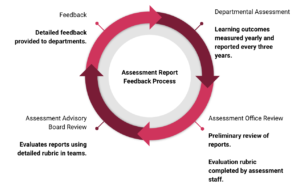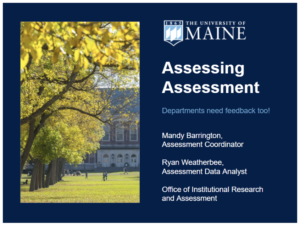Assessing Assessment – Programs Need Feedback Too!
Assessment work is typically focused at the course or program level, where plans are put in place to measure and reflect on student learning. However, there is a steep learning curve to develop effective and efficient assessment processes. Like any learning process, meaningful feedback is needed for growth and improvement to happen. To help support this growth, the Office of Institutional Research and Assessment (OIRA) and the Assessment Advisory Board (AAB) have implemented a new feedback process for 3-Year Assessment Summary Reports at the undergraduate level. The foundation of this feedback process is a detailed analytic rubric created by Fulcher et al (2017) that we adapted for use at UMaine. The rubric breaks down different achievement levels of all aspects of the program assessment process and provides an efficient way to provide formative feedback to programs so they know what aspects of the process to work on moving forward.

An overview of the new process is provided in the figure above. It starts with submission of the 3-Year Assessment Summary Reports by each department at the end of June. OIRA staff review the reports over the summer using the rubric. In the fall, the AAB conducts a similar review using the same rubric, with guidance from OIRA staff. Consensus between the OIRA review and AAB review is achieved through discussion and the rubric feedback is provided to the program.
Our new feedback process was presented at the 2020 NECHE Conference this month, in the form of a virtual poster (a short video presentation). You can view our presentation by clicking on the image below:
Our hope is this new feedback process will result in improved program assessment processes and bolster the culture of assessment on campus.
Reference:
Fulcher, K., Smith, K., Sanchez, E., & Sanders, C. (2017). Needle in a Haystack: Finding Learning Improvement in Assessment Reports. AIR Professional File, (Summer 2017), 19–33.

